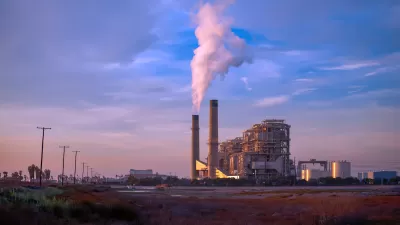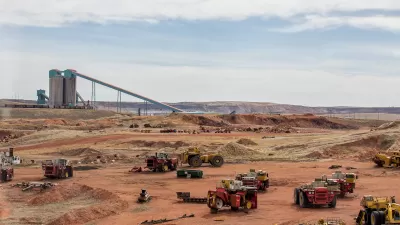In a recent interview with newspaper columnists, President Barack Obama spent some time discussing the idea of a national infrastructure bank and the chances of one taking shape.
"Question: You've got infrastructure spending in the stimulus package. The need is much faster than that and the money is tight. Do you anticipate any significant further additions in federal infrastructure spending in the reasonably near future, and are you making plans to establish an infrastructure bank?
Obama: Well, number one, we've got the transportation reauthorization bill that's going to be coming up. So one thing to keep some perspective about on the recovery package is this is supposed to provide a jolt to the economy above and beyond what we're doing already in the federal budget. And so I expect that Secretary LaHood, working with the various transportation committees are going to be moving forward on a transportation bill. I would like to see some long-term reforms in how transportation dollars flow, and I'll give you just a couple of examples. I think right now we don't do a lot of effective planning at the regional level when it comes to transportation. That's hugely inefficient. Not only does it probably consume more money in terms of getting projects done, but it also ends up creating traffic patterns, for example, that are really hugely wasteful when it comes to energy use.
If we can start building in more incentives for more effective planning at the local level, that's not just good transportation policy, it's good energy policy. So we'll be working with transportation committees to see if we can move in that direction.
The idea of an infrastructure bank I think make sense -- the idea that we get engineers, and not just elected officials, involved in thinking about and planning how we're spending these dollars. I may get some objections from my colleagues, Democrat and Republican, on the Hill about that, but I think there should be some way for us to -- just think how can we rationalize the process to get the most bang for the buck, because the needs are massive and we can't do everything, and if it's estimated that just on infrastructure alone it would cost a couple trillion dollars to get our roads, bridges, sewer systems, et cetera, up to snuff, and we know we're not going to have that money, then it would be nice if we said here are the 10 most important projects and let's do those first, instead of maybe doing the 10 least important projects but the ones that have the most political pull.
Q. Can you do that without an infrastructure bank?
Obama: I think that an infrastructure bank is important potential tool for getting that done. As I said, there's probably going to be some resistance that doesn't fall along partisan lines, but rather has to do with legislators being understandably protective about their ability to influence these decisions."
Thanks to Tim Steinitz
FULL STORY: Obama Interview Transcript

Planetizen Federal Action Tracker
A weekly monitor of how Trump’s orders and actions are impacting planners and planning in America.

Map: Where Senate Republicans Want to Sell Your Public Lands
For public land advocates, the Senate Republicans’ proposal to sell millions of acres of public land in the West is “the biggest fight of their careers.”

Restaurant Patios Were a Pandemic Win — Why Were They so Hard to Keep?
Social distancing requirements and changes in travel patterns prompted cities to pilot new uses for street and sidewalk space. Then it got complicated.

Platform Pilsner: Vancouver Transit Agency Releases... a Beer?
TransLink will receive a portion of every sale of the four-pack.

Toronto Weighs Cheaper Transit, Parking Hikes for Major Events
Special event rates would take effect during large festivals, sports games and concerts to ‘discourage driving, manage congestion and free up space for transit.”

Berlin to Consider Car-Free Zone Larger Than Manhattan
The area bound by the 22-mile Ringbahn would still allow 12 uses of a private automobile per year per person, and several other exemptions.
Urban Design for Planners 1: Software Tools
This six-course series explores essential urban design concepts using open source software and equips planners with the tools they need to participate fully in the urban design process.
Planning for Universal Design
Learn the tools for implementing Universal Design in planning regulations.
Heyer Gruel & Associates PA
JM Goldson LLC
Custer County Colorado
City of Camden Redevelopment Agency
City of Astoria
Transportation Research & Education Center (TREC) at Portland State University
Camden Redevelopment Agency
City of Claremont
Municipality of Princeton (NJ)




























